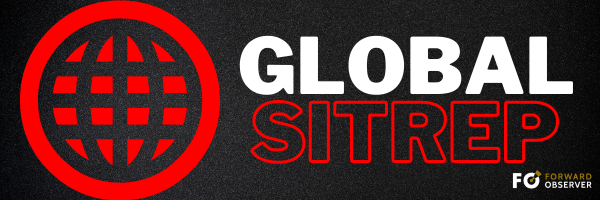Good morning, and welcome to the Global Situation Report for Friday, 12 April 2024.
- ISRAEL GREENLIGHTS RESPONSE TO POTENTIAL IRAN ATTACK: Israeli media is reporting that the Israeli Defense Forces (IDF) and Mossad have approved plans to respond to a potential Iranian attack.
- Israeli officials believe that Iran still intends to carry out the attacks.
Why It Matters: When U.S. strikes killed IRGC-QF commander Qasem Soleimani in January 2020, Iran responded about a week later with missile attacks on Iraqi bases housing U.S. personnel. It’s now been almost two weeks since Israel killed senior Iranian Revolutionary Guard Corps – Quds Force (IRGC-QF) generals with airstrikes in Syria. One possible reason for the delay is that there’s almost certainly dissension within Iranian military and political circles over how severe a response should be. Other potential factors are that Iran continues to develop targets or may be having difficulty with targeting senior Israeli officials. Western governments have also warned Iran not to carry out attacks against Israel, so the delay could be caused by Iranian intelligence trying to judge a U.S. response. My bet is that Iran will respond, but leaders don’t want to risk escalation and trigger an Israeli war they don’t want. The delay in response, therefore, may be a way to reduce tensions and maintain the tit-for-tat status quo. – M.S.
- RUSSIA SAYS CHINA IS NOW RESTRICTING PAYMENTS: Chinese officials are blocking some payments from Russian banks for purchasers attempting to buy Chinese electronics components, according to Russian media.
- A separate Russian news outlet reported that Chinese banks are asking detailed questions about Russian purchase orders of electronics components, including whether the components will be used in equipment involved in the Ukraine war.
Why It Matters: These reports come after U.S. Treasury Secretary Janet Yellen met with Chinese officials in Beijing to discuss U.S-China trade and Russian sanctions. Chinese banks and companies were previously concerned about being hit with secondary sanctions for selling materiel to Russia, which could wind up on Ukrainian battlefields. It appears that at least part of Yellen’s mission was successful in curbing Chinese support for Russia’s war efforts. Other countries, like Turkey, have also cut financial ties to some Russian banks after threats from the U.S. Treasury Department. – M.S.
- RUSSIA, CHINA AGREE ON “NEW SECURITY ARCHITECTURE”: Russian Foreign Minister Sergey Lavrov and Chinese Foreign Minister Wang Yi met this week to discuss a “new security architecture” following multiple strategic agreements between the United States and Indo-Pacific countries.
- “[We discussed a] new security architecture in Eurasia… We have talked a lot about the need to ensure security and stability in the Asia-Pacific region, where the U.S. continues to pursue a policy of private military and political alliances with limited membership that are clearly directed against China and Russia,” Lavrov said.
Why It Matters: In 2022, Chinese President Xi Jinping launched the Global Security Initiative, a multilateral diplomatic and security effort intended to counter the United States’ relationships with Asia-Pacific countries and a Global NATO currently ‘stretching its hands’ into Asia. Senior Russian and Chinese officials have accused the U.S. of engaging in Cold War-era “bloc politics” in reference to U.S. efforts to build extra-regional alliances against China. The U.S. is very openly trying to isolate Russia and China, while the pair are having less success in countering the Western strategy. This “new security architecture” could include an air and missile defense agreement in direct response to the recent news that the U.S., Japan, and Australia are building a new networked air, missile, and defense architecture of their own. – M.S.
- Global Rollup
- The U.S.-Japan-Philippines Trilateral summit produced no concrete future steps. Still, it did result in promises of modernization of Philippine ports, a collective response to China’s actions, and the initiation of semiconductor production in the Philippines.
- China’s Foreign Ministry ordered its diplomats to make “serious démarches” to the “relevant parties” due to the U.S. and Japan’s declarations during the bilateral summit.
- China’s Chairman of the National People’s Congress, Zhao Leji, is visiting North Korea to discuss boosting economic, political, and regional security ties with his counterpart. This is the highest level of talk in five years.
- Finnish president Alexander Stubb told reporters that he’s worried about “belligerent conversations” about a European war with Russia. He advised other countries’ leaders to tone down the rhetoric while redoubling efforts to prepare for war. He added that Russian President Vladimir Putin may be aiming for a major breach of Ukrainian lines by September.
- For the first time, France has placed its aircraft carrier FS Charles de Gaulle and its entire support fleet, including a nuclear attack submarine, under NATO command for a Mediterranean Sea “operational surveillance” mission. One French admiral characterized the mission as being “much more significant than an exercise.” [AC: This could be in response to a potential Iranian attack against Israel.]
THAT’S A WRAP: This does it for today’s edition. Thank you for reading. If you know folks who would also like to receive this email, would you please forward it to them? We appreciate you spreading the word. – M.S.

